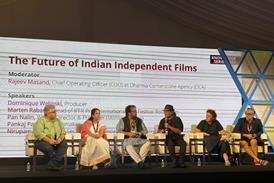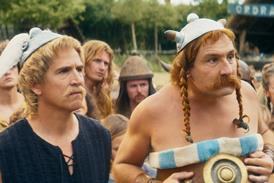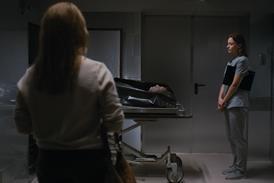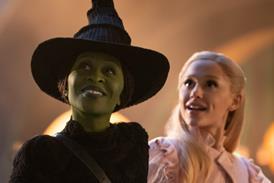Dir: Bill Condon. US. 2013. 127mins
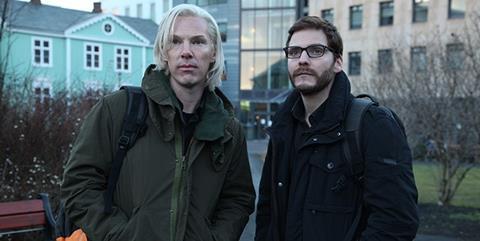
The captivating mystery of Julian Assange and the ethical quandary inspired by his online organisation WikiLeaks get only a slick overview in The Fifth Estate. Director Bill Condon has chosen to turn Assange’s story into a tech-heavy political thriller, but the audacity of the approach mostly results in a simplistic (albeit often engaging) telling that fails to offer much insight into either the man or his creation.
The Fifth Estate’s thriller mind-set tends to cheapen the moral questions at the heart of WikiLeaks’ mission.
After its Gala Presentation at the Toronto Film Festival, The Fifth Estate will be released in the US in October. With the recent leak of American intelligence secrets by Edward Snowden still making news, the film could capitalise on the increased debate about the merits of government transparency. And the movie’s thriller components might help at the box office, as could the presence of Benedict Cumberbatch, who played the villain in this summer’s Star Trek Into Darkness. Still, The Fifth Estate will need good critical buzz to attract audiences to what may seem to the general public to be somewhat unsexy subject matter.
Based on two books — including one by Daniel Domscheit-Berg, who’s a major character in the film — The Fifth Estate charts Assange’s (Cumberbatch) ascension from hacker-activist to the feared and despised leader of WikiLeaks, a website that publishes confidential government and corporate information in the hope of exposing the truth about these institutions. Assisted by Domscheit-Berg (Daniel Brühl), his close confidant and fellow believer about the need to protect whistleblowers, Assange begins to exult in his newfound fame and power, although it does place him into the crosshairs of the American government.
Of late, Condon has become a bankable Hollywood director by helming Dreamgirls and the final two Twilight films, and the sleek professionalism of The Fifth Estate speaks to his ease with accessible, efficient studio filmmaking. The hope, however, is that he would be able to marry this mainstream approach to his earlier indie work such as Gods And Monsters and Kinsey in which he focused on complex character relationships.
Alas, it’s here where The Fifth Estate falters. As crafted by screenwriter Josh Singer, the movie ventures between an almost Bourne-like sense of whiplash suspense and a character drama between Assange and Domscheit-Berg in which the close friends begin to have differing views about WikiLeaks’ objective. (Additionally, The Fifth Estate spends time chronicling the ups and downs of Domscheit-Berg’s relationship with his girlfriend, played by Alicia Vikander, who serves as a voice of reason when WikiLeaks starts getting reckless with the sensitive material it’s exposing.) But the character work seems perfunctory, whether it’s the mediocre exploration of Assange and Domscheit-Berg’s dynamic or the shallow investigation into Assange’s past to hint at what drew him to be so antiauthoritarian.
As played by Cumberbatch, Assange is an enigma with the slightest hint of contempt flickering across his eyes. In truth, the performance isn’t that far removed from his portrayal of Khan in Star Trek Into Darkness: Both men exhibit an unnervingly inhuman calm that suggests great intelligence but also smug aloofness. Condon’s attitude toward Assange seems to be that he is a brilliant, passionate muckraker who let ego get in the way of his honourable intentions. But by trying to be fair-minded in their treatment of Assange, the director and his star stay frustratingly on the surface, unable to capture the man’s off-kilter magnetism or his ambition. (Likewise, Brühl’s milquetoast turn as Domscheit-Berg is too reactive to elicit much empathy.)
When The Fifth Estate travels through WikiLeaks’ most memorable moments — including unearthing documents concerning the US’s war in Afghanistan — the movie gains momentum, showing the high-stakes game Assange is playing with American government officials, portrayed in the movie chiefly by an Under Secretary of State played by Laura Linney. And to Condon’s credit, the movie manages to make computer coding and document leaks visually appealing.
But The Fifth Estate’s thriller mind-set tends to cheapen the moral questions at the heart of WikiLeaks’ mission, such as: Is it acceptable to put intelligence officers and undercover agents at risk if it helps save soldiers’ lives? If done right, the filmmakers’ strategy to make The Fifth Estate viscerally exciting would nicely mimic the intrigue and anxiety of Assange’s quest for top-secret information, producing a 21st-century All The President’s Men. But without engaging characters or a serious grasp of the ethical issues at play, The Fifth Estate reduces a serious on-going debate about the public’s right to know to little more than a sporadically entertaining espionage movie.
Production companies: DreamWorks Pictures, Reliance Entertainment, Participant Media, Anonymous Content
US distribution: Walt Disney Pictures, http://movies.disney.com/
Producers: Steve Golin, Michael Sugar
Executive producers: Richard Sharkey, Paul Green, Jeff Skoll, Jonathan King
Screenplay: Josh Singer, based on the book Inside WikiLeaks by Daniel Domscheit-Berg and the Guardian book WikiLeaks written by David Leigh and Luke Harding
Cinematography: Tobias Schliessler
Production design: Mark Tildesley
Editor: Virginia Katz
Music: Carter Burwell
Website: www.facebook.com/TheFifthEstateMovie
Main cast: Benedict Cumberbatch, Daniel Brühl, Anthony Mackie, David Thewlis, Alicia Vikander, Peter Capaldi, Carice van Houten, Dan Stevens, Stanley Tucci, Laura Linney




